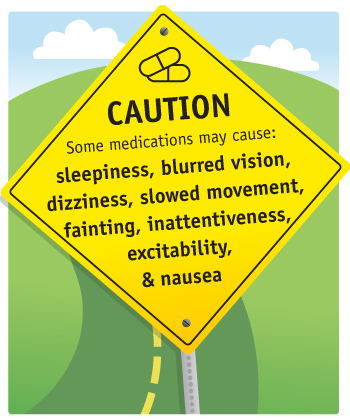For Consumers
Some Medications and Driving Don't Mix

|
On this page:
If you are taking a medication, is it OK to drive?
Most likely, yes. But the Food and Drug Administration (FDA) advises that it's best to be absolutely sure before you get behind the wheel.
While most medications don't affect driving ability, some prescription and over-the-counter (OTC) medicines can cause reactions that may make it unsafe to drive.
These reactions may include
- sleepiness/drowsiness
- blurred vision
- dizziness
- slowed movement
- fainting
- inability to focus or pay attention
- nausea
- excitability
Driving while on medications can also be a legal issue. State laws differ, but being found driving under the influence of certain medications (prescription and OTC products) could get you in the same kind of trouble as people caught driving under the influence of alcohol.
Products That Require Caution
Knowing how your medications—or any combination of them—affect your ability to drive is clearly a safety measure involving you, your passengers, and others on the road.
Products that could make it dangerous to drive include
- prescription drugs for anxiety
- some antidepressants
- products containing codeine
- some cold remedies and allergy products
- tranquilizers
- sleeping pills
- pain relievers
- diet pills, "stay awake" drugs, and other medications with stimulants (e.g. caffeine, ephedrine, pseudoephedrine)
Products that contain stimulants may cause excitability or drowsiness. Also, never combine medication and alcohol while driving.
If You Have To Drive
Let's say that you must take medications that could affect your driving. But you also have to get to work, pick up the kids from school or sports practice, or run errands. Here are some tips for what to do:
Don't stop using your medicine unless your doctor tells you to. Take medications at prescribed levels and dosages.
Talk to your health care professionals about side effects. Doctors and pharmacists can tell you about known side effects of medications, including those that interfere with driving. Request printed information about the side effects of any new medicine.
Inform health care professionals about all of the products you are taking, including prescription, OTC, and herbal products. Also, let them know about any reactions you may experience.
Health care professionals may be able to
- adjust the dose
- adjust the timing of doses or when you use the medicine
- add an exercise or nutrition program to lessen the need for medicine
- change the medicine to one that causes less drowsiness
Monitor yourself. Learn to know how your body reacts to the medicine and supplements. Keep track of how you feel, and when the effects occur.
Carry a medication list. In case of an emergency, carry a list of all medications you are taking, including product names and dosages.
Alternatives to Driving Yourself
Planning ahead will help get you to the places you want to go. Consider the following alternatives to driving yourself:
- rides with family and friends
- taxi cabs
- shuttle buses or vans
- public buses, trains, and subways
- walking
Also, senior centers and religious and other local service groups often offer transportation services for older adults in the community.
- Seniors can call the ElderCare Locator at 1-800-677-1116 and ask for the phone number of the local Office on Aging, or go to the Web site at www.eldercare.gov.
- Regional transit authorities can provide information on which bus or train to take.
- Easter Seals Project ACTION (Accessible Community Transportation In Our Nation) can direct you to transportation resources near you. Call 1-800-659-6428 or visit www.projectaction.org.
This article appears on FDA's Consumer Updates page, which features the latest on all FDA-regulated products.
Date Posted: December 11, 2008







